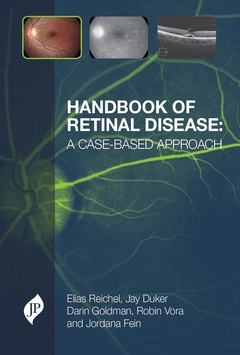Description
Handbook of Retinal Disease: a Case-based Approach, New edition
a case...
Authors: Reichel Elias, Duker Jay, Goldman Darin, Fein Jordana, Vora Robin
Language: English
Subjects for Handbook of Retinal Disease: a Case-based Approach:
352 p. · 16x24 cm · Hardback
Out of Print
Description
/li>Contents
/li>Biography
/li>
Some of the best clinical teaching happens during grand rounds, imaging conferences and the discussion of individual cases, but for ophthalmologists working in smaller centers, such opportunities can be infrequent. Handbook of Retinal Disease offers the benefit of a case discussion by describing retinal disorders through real-life examples, from a presenting problem through the differential diagnosis, an analysis of the imaging and other diagnostic results, to an outline treatment plan.
The book features over 75 cases, each presented with a table of signs and symptoms to help with the differential diagnosis, questions to ask the patient and relevant imaging to order. Secondly, imaging results from relevant modalities are discussed, before a final diagnosis is put forward. The authors provide concise information on the diagnosis, including an outline of recommended treatments, follow-up and further reading.
With its high quality images and highly structured, deductive approach, Handbook of Retinal Disease provides a clinically relevant guide to the latest imaging techniques used in the diagnosis of retinal diseases: OCT, colour and red fundus photography, fluorescein and indocyanine green angiography and fundus autofluorescence.
Key Points
- Each case gives a structure for working up a differential diagnosis and treatment plan based on a challenging set of signs and symptoms
- Shows imaging results drawn from the full array of relevant, current imaging modalities
- Provides treatment plans tailored to each patient and reflecting the complex nature of some cases
1. Normal retina
2. Diabetic retinopathy
3. Venous occlusive disease
4. Arterial occlusive disease
5. Retinal arterial macroaneurysm
6. Radiation retinopathy
7. Hypertensive retinopathy
8. Sickle cell retinopathy
9. Ocular ischemic syndrome
10. Macular telangiectasia and Coats disease
11. Retinopathy of prematurity
12. Dry age-related macular degeneration
13. Wet (exudative) age-related macular degeneration
14. Central serous chorioretinopathy
15. Polypoidal chorioretinopathy
16. Retinal angiomatous proliferation
17. Pattern dystrophy
18. Angioid streaks
19. Myopic degeneration
20. Full thickness macular hole
21. Lamellar macular hole
22. Vitreomacular traction syndrome
23. Epiretinal membrane
24. Macular pseudohole
25. Posterior vitreous detachment
26. Vitreous hemorrhage
27. Asteroid hyalosis
28. Cholesterolosis
29. Persistent fetal vasculature
30. Toxic maculopathy
31. Photic maculopathy
32. Retinal tear
33. Retinal detachment
34. Lattice degeneration
35. Toxoplasmosis
36. Cat scratch disease
37. Cytomegalovirus retinitis
38. Acute retinal necrosis
39. Endophthalmitis
40. Syphilitic chorioretinitis
41. Tuberculosis
42. Unilateral acute idiopathic maculopathy
43. Sarcoid
44. Vitreoretinal lymphoma
45. Multifocal evanescent white dot syndrome
46. Acute multifocal placoid pigment epitheliopathy
47. Acute macular neuroretinopathy
48. Punctate inner choroidopathy
49. Birdshot retinochoroidopathy
50. Intermediate uveitis
51. Vogt–Koyanagi–Harada syndrome
52. Behçet’s disease
53. Retinitis pigmentosa
54. Cone and cone-rod dystrophy
55. Stargardts disease
56. Best vitelliform macular dystrophy
57. Choroidal dystrophies
58. Familial exudative vitreoretinopathy
59. X-linked retinoschisis
60. Choroidal nevus
61. Choroidal melanoma
62. Choroidal hemangioma
63. Cavernous hemangioma
64. Capillary hemangioma
65. Combined hamartoma of the retina and retinal pigment epithelium
66. Retinoblastoma
67. Choroidal metastases
68. Commotio retinae
69. Choroidal rupture
70. Valsalva retinopathy
71. Purtschers retinopathy
72. Intraocular foreign body
73. Nonaccidental trauma
74. Silicone oil emulsification
75. Retained perflurocarbon
76. Globe perforation from local anesthesia
77. Suprachoroidal hemorrhage
Elias Reichel, MD
Professor and Vice Chair
Jay Duker MD
Professor and Chair
Darin Goldman MD
Vitreoretinal Fellow
Jordana Fein MD
Medical Retinal Fellow
All at Department of Ophthalmology, Tufts University School of Medicine, Boston, MA USA
Robin Vora MD
Medical Retinal Consultant and Cataract Surgeon, Kaiser Permanente Hospital, Oakland, CA USA
These books may interest you

Ocular Oncology 210.99 €



